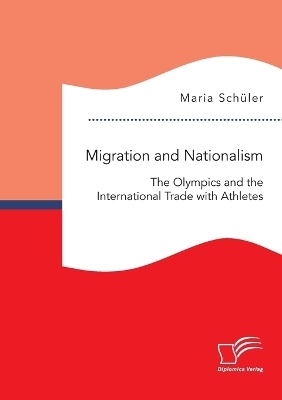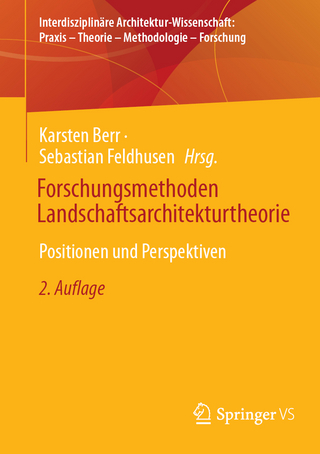
Migration and Nationalism. The Olympics and the International Trade with Athletes
Diplomica Verlag
978-3-96146-948-2 (ISBN)
Maria Schüler, B.A., was born in Hessen, Germany, in 1996. In August 2020, Maria completed their Bachelor's degree in Social Sciences with the major migration and integration at the Catholic University of Mainz. During their studies, Maria spent a mandatory year abroad. In Riga, Latvia, Maria studied one semester political and communication sciences. Afterwards, Maria spent six months as part of the Olympic Studies Research Group at the Pontifícia Universidade Católica do Rio Grande do Sul in Porto Alegre, Brazil. Linked to the activities that Maria pursued in the research group, they wrote a thesis on the topics nationalism and sports of the Modern, which are analysed focused on the Olympic Movement as a practical example.Due to the diverse knowledge and skills that Maria acquired during their previous education, they perused an interdisciplinary research perspective. Currently, the main research interest of Maria considers medicine-ehtics and law, as well as queer dynamics in society.
Text sample:2.3. Economic and Political Approaches:World-systems theory is a dominant approach of the analysis of global relations. This chapter considers the development and origins of this theory. Furthermore, key elements of world-systems theory are analysed. Territorial factors, nations as agents, and capitalistic aspects are specifically focused on. Afterwards, the origins of human capital theory are explored. This theory considers cost-benefit approaches in migration. Education, as a particular form human capital is outlined. Physical education is especially important to identify as a theme in this book to create connections with the later central analysis.2.3.1. World-Systems Theory:In the nineteenth century, world-systems theory originated as a result of the 'rejection of social science categories' (Wallerstein, 2013, p. 1). The theory 'was a protest or resistance movement within the structures of knowledge' (Lee, 2011, p. 27). Inevitably, the growing structures of knowledge led to a 'process of rationalizing', and this turned into a crisis. A result of this process is a changing world view from an autonomous unit towards a relational system (cf. ibid, p. 36). According to Lee, this rationalisation can also be called 'secularisation' or 'scientisation' (cf. ibid, p. 27). The aim of this method of analysing global relations was to move away from the separation of different disciplines of social sciences towards a universal analysis, embedded in history. Therefore, it is important to clarify that world-systems theory 'is not a subcategory of sociology' (Wallerstein, 2013, p. 1). It needs to rather be seen 'as a new perspective on social reality.' (Wallerstein, 2007, p. 1). As the term 'world-system' suggests, it is a macro-sociological analysis, which focuses on a 'capitalist world economy' in the context of a 'total social system' (cf. Martínez Vela, 2001, p. 1). Wallerstein points out that world-systems theory, or world-systems analysis, 'rejects the utility and even the validity of sociology today as an intellectual category, while acknowledging its continued strength as an organizational reality, and as a cultural preference.' (Wallerstein, 2013, p. 1). The use of the term 'world-system analysis' instead of 'world-system theory' is insofar more appropriate, as it highlights the importance of its consideration as a knowledge movement. Hence, Wallerstein indicates the primary strength of this analysis: it has resisted the temptation to define itself too narrowly and dogmatically, while still not allowing itself to be defined so loosely that anything that seems to deal with questions beyond the space of single nations/societies/social formations is deemed within the family. (Wallerstein, 2013, p. 7)To analyse the world-system, a comparison of stakeholders of this system is also implied. Here, theorists not only talk about separated nations, but also about multinational companies as collective agents (cf. Faist, et al., 2014, p. 157). This cross-national relation often shows the 'development and unequal opportunities across nations' (Martínez Vela, 2001, p. 1). As a result, this 'combination makes the world-system project both a political and an intellectual endeavor.' (ibid). Wallerstein classifies three key elements of world-systems analysis. First, the significance of the analysing unit. As mentioned before, the level of analysis in this book is not particularly 'a State/society/social formation' (Wallerstein, 2014, p. 4), but is rather based upon the context of a cross-linked system. For Wallerstein, 'world' cannot be understood as synonymous for 'global or planetary but simply to refer to a relatively large unit (relatively large in terms of area and population) within which there is an axial division of labor.' (ibid). Second, the world-system analysis is not everlasting. Besides world-system analysis, Wallerstein defines any system as following: They have lives. They come into existence; they pursue th
| Erscheinungsdatum | 18.05.2023 |
|---|---|
| Sprache | englisch |
| Maße | 155 x 220 mm |
| Gewicht | 179 g |
| Themenwelt | Sozialwissenschaften ► Soziologie ► Allgemeine Soziologie |
| Schlagworte | Critical analysis • internationalism • Migrated Athlete • Modern society • Politics • Sports |
| ISBN-10 | 3-96146-948-2 / 3961469482 |
| ISBN-13 | 978-3-96146-948-2 / 9783961469482 |
| Zustand | Neuware |
| Informationen gemäß Produktsicherheitsverordnung (GPSR) | |
| Haben Sie eine Frage zum Produkt? |
aus dem Bereich


